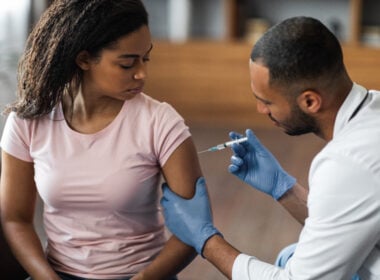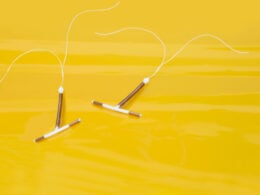As reported in MEL Magazine, when William from Kentucky got a vasectomy at the age of 34, he expected some limited and short-lived pain based on his doctor’s reassuring advice. At first his vasectomy side effects seemed normal, but as the weeks went on, the pain didn’t fade. Months later, the pain got even worse, making his life unbearable. He reports: “I had to go on short-term disability and FMLA leave. I couldn’t do my job. At this point, I was collapsing mentally.” He also developed depression so severe that he was bed-ridden for a month.
William finally found some help and is in recovery, but still experiences regular, sharp pain: “about twice a day, I experience a pain similar to being kicked in the nuts—including the nausea that comes with it.” The vasectomy has also led to a serious loss of physical intimacy in his marriage: “Oh yeah, my sex life has drastically declined. It just doesn’t feel the same.”
Like William, many men are encouraged to have a vasectomy as an effective and minimally painful procedure. The introduction of the Mayo Clinic’s webpage on vasectomies presents five reasons for signing up for going under the knife: it’s safe, it’s 100% effective, it’s a low-risk outpatient surgery procedure, it’s cheaper than a woman’s sterilization procedure (known as a tubal ligation), and it eliminates the need for other birth control methods.
But is it really that low-risk? The Mayo Clinic and other medical sites report on the side effects and risks that accompany vasectomies, but they tend to minimize them. It is essential that men and couples who are considering vasectomies weigh the following risks very carefully before making a permanent decision that cannot easily be reversed.
The most common and critical side effect of vasectomies: Regret
Bryan Copper, 38, from Tennessee also writes for MEL Magazine that he was married and in his 20s when he got his vasectomy. He later divorced and started life again with someone else, “but we would never be able to have our own biological child together. Basically, I rushed an important decision because I loved someone and thought that wouldn’t change.” Bryan’s experience illustrates how some men who go under the scalpel (with the good intentions of being the ones to carry the burdens of family planning for their partners) can later come to regret it.
Tellingly, when I recently checked the stats for certain Google keyword searches, here is what I found: For the phrase “vasectomy near me,” there are approximately 18,100 searches per month; for “vasectomy side effects,” 22,200 searches per month, and for “vasectomy reversal,” 60,500 searches per month. In clinical practice, about six to ten percent of men who have had a vasectomy ultimately seek a reversal, according to the Cleveland Clinic.
Why do men want vasectomy reversals? There can be several reasons, but top among them are life changes. People divorce and restart life, some will lose a child, some will realize that their family size wasn’t ideal after all, and that there is room for more children. Another reason is chronic pain from the vasectomy, known clinically as chronic orchialgia, which happens in up to 15% of men who have had a vasectomy. For these men, the biggest side effect from their vasectomies can end up being regret.
Do vasectomy reversals work?
Vasectomy reversal is possible, but it doesn’t always restore a man’s fertility.
The vasectomy surgery involves cutting or blocking the two vas deferens, the tubes or ducts that take sperm to the semen and ensure normal, fertile ejaculate. When these tubes are cut, sperm cells continue to be produced in the testes, but cannot make their way to the semen, making ejaculate infertile. However, some sperm may leak out through the cut ends of the sperm ducts (even though the ducts are tied off in a vasectomy, as sperm are very small!).
Dr. Joel Brind, Professor Emeritus of Human Biology and Endocrinology at Baruch College, City University of New York, explains what happens next: “Once the sperm leak into the scrotum, they are available to circulating immune cells for the first time in the man’s life, and so the immune system reacts to them as if they were foreign invaders (because, as sex cells, they are actually genetically different from the man’s somatic cells). Thus, specific antibodies are made against the sperm, and the tissues within the testes that make the sperm are slowly destroyed by the body’s own immune system.”
In other words, a vasectomy can be reversed, but the damage to sperm production and men’s fertility is not always reversible—especially if ten or more years have passed since the vasectomy. Besides, a vasectomy reversal costs between $6,000 and $15,000, and as an elective procedure, it is rarely covered by insurance.
Other side effects of vasectomies
Different sources report vasectomy side effects differently, but some key risks to consider are as follows:
- Post-vasectomy pain: reported by one to 15 percent of men who undergo the procedure. This pain can be short term, but sometime requires pain management or additional surgery.
- Sperm granulomas, which are “knot-like tumors localized in the testis, epididymis, or ductus deferens:” these can be another cause of pain, and happen to 40 percent of men who undergo a vasectomy.
- Infection and/or hematoma: these conditions can appear right after surgery and tend to go away, but in some rare exceptions, could become more critical (e.g., Fournier gangrene, endocarditis, arteriovenous fistulas, and angiocutaneous fistulas).
- Endocarditis, in particular, is a life-threatening inflammation of the inner lining of your heart’s chambers and valves (known as the endocardium). Endocarditis is usually caused by an infection.
- An arteriovenous fistula is an abnormal connection between an artery and a vein that can cause serious complications if not treated.
Other delayed complications listed by the Mayo Clinic:
- “Fluid buildup in the testicle, which can cause a dull ache that gets worse with ejaculation”
- “An abnormal cyst (spermatocele) that develops in the small, coiled tube located on the upper testicle that collects and transports sperm (epididymis)”
- “A fluid-filled sac (hydrocele) surrounding a testicle that causes swelling in the scrotum”
Considering other options for family planning
Bryan, mentioned above, gives this advice: “If you’re in your 20s and considering getting a vasectomy, wait. I didn’t want children at that time in my life. I thought I was still too young at 25, but [having kids] changed my life for the better and made me the person I am today. The pros seem to outweigh the cons at this point in life, but if you consider yourself emotionally mature enough to make that decision, why not be emotionally mature enough to realize time changes all? It will change your wants, desires, relationships and life goals.”
The desire to take responsibility for family planning as a man is honorable, and that’s why we recommend considering natural family planning. This option is side effect free for both men and women, and can be “reversed” anytime the couple wants to achieve pregnancy. Proficiency in charting their menstrual cycles also offers women the benefits of extensive health literacy and practical data on their fertility. Natural methods provide two excellent ways for men to be involved in supporting their spouse: practicing abstinence from sex a few days during the fertile period, and being involved in helping her with charting her cycle. With training and good mutual communication, it is a highly effective method that actually improves relationships.
Additional Reading:
Done with kids: thinking of sterilization?
Male Sex Hormones Are a Big Deal, Too












Women regret their husband’s vasectomy even when he doesn’t.
My husband and I considered going this route after our two children were born.
I asked the doctor up front about reversal, “in case something were to happen to the kids or something like that.”
The doc, an honorable man, said, “If you are even thinking that way, then you should probably not go forward.”
Later we learned NFP. I am grateful to that doctor.